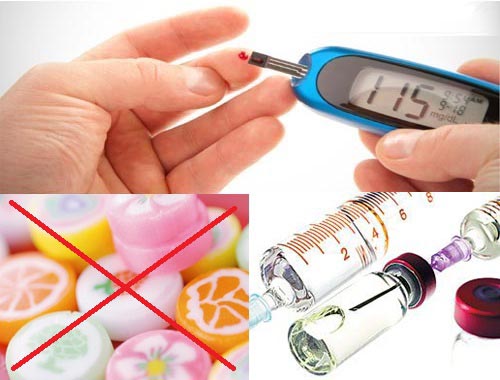Diabetes, Diabetes Mellitus

Published: 18 Jun 2025
ICD9: 250.00 ICD10: E11.9 ICD11: 5A14
"Diabetes, Diabetes Mellitus" refers to a group of metabolic diseases characterized by elevated blood sugar (glucose) levels.
This happens because the body either doesn't produce enough insulin, or the cells don't respond properly to the insulin that is produced, or both. Insulin is a hormone produced by the pancreas that allows glucose from the food we eat to enter cells to be used for energy.
Think of it like this:
![]() Glucose is like fuel for your car (cells).
Glucose is like fuel for your car (cells).
![]() Insulin is like the key to unlock the fuel tank and let the fuel into the engine.
Insulin is like the key to unlock the fuel tank and let the fuel into the engine.
When you have diabetes:
![]() Type 1 Diabetes: The body's immune system attacks and destroys the insulin-producing cells in the pancreas. It's as if someone broke the key-making machine. The body produces little to no insulin.
Type 1 Diabetes: The body's immune system attacks and destroys the insulin-producing cells in the pancreas. It's as if someone broke the key-making machine. The body produces little to no insulin.
![]() Type 2 Diabetes: The body either doesn't produce enough insulin, or the cells become resistant to insulin (the key doesn't work as well anymore). This is often related to lifestyle factors like diet and exercise, and genetics.
Type 2 Diabetes: The body either doesn't produce enough insulin, or the cells become resistant to insulin (the key doesn't work as well anymore). This is often related to lifestyle factors like diet and exercise, and genetics.
![]() Gestational Diabetes: Develops during pregnancy. Hormones interfere with insulin's action.
Gestational Diabetes: Develops during pregnancy. Hormones interfere with insulin's action.
Consequences of High Blood Sugar (Hyperglycemia):
Over time, high blood sugar can lead to serious health problems affecting many major organ systems, including:
![]() Heart disease: Increased risk of heart attack, stroke, and high blood pressure.
Heart disease: Increased risk of heart attack, stroke, and high blood pressure.
![]() Kidney disease (Nephropathy): Can lead to kidney failure.
Kidney disease (Nephropathy): Can lead to kidney failure.
![]() Nerve damage (Neuropathy): Can cause numbness, tingling, and pain, especially in the hands and feet. This can also affect digestion and other bodily functions.
Nerve damage (Neuropathy): Can cause numbness, tingling, and pain, especially in the hands and feet. This can also affect digestion and other bodily functions.
![]() Eye damage (Retinopathy): Can lead to blindness.
Eye damage (Retinopathy): Can lead to blindness.
![]() Foot problems: Nerve damage and poor circulation increase the risk of infections, ulcers, and even amputation.
Foot problems: Nerve damage and poor circulation increase the risk of infections, ulcers, and even amputation.
![]() Skin conditions: Increased susceptibility to bacterial and fungal infections.
Skin conditions: Increased susceptibility to bacterial and fungal infections.
![]() Cognitive decline: Increased risk of Alzheimer's disease and other forms of dementia.
Cognitive decline: Increased risk of Alzheimer's disease and other forms of dementia.
Symptoms of Diabetes:
Symptoms can vary depending on the type of diabetes and the individual. Some people, especially with type 2 diabetes, may not experience any symptoms for years. Common symptoms include:
![]() Frequent urination, especially at night (polyuria)
Frequent urination, especially at night (polyuria)
![]() Excessive thirst (polydipsia)
Excessive thirst (polydipsia)
![]() Unexplained weight loss
Unexplained weight loss
![]() Increased hunger (polyphagia)
Increased hunger (polyphagia)
![]() Blurry vision
Blurry vision
![]() Slow-healing sores
Slow-healing sores
![]() Frequent infections
Frequent infections
![]() Numbness or tingling in the hands or feet
Numbness or tingling in the hands or feet
![]() Fatigue
Fatigue
![]() Dry, itchy skin
Dry, itchy skin
Diagnosis:
Diabetes is usually diagnosed with blood tests that measure blood glucose levels. Common tests include:
![]() Fasting Plasma Glucose (FPG): Measures blood glucose after an overnight fast.
Fasting Plasma Glucose (FPG): Measures blood glucose after an overnight fast.
![]() Oral Glucose Tolerance Test (OGTT): Measures blood glucose after drinking a sugary drink.
Oral Glucose Tolerance Test (OGTT): Measures blood glucose after drinking a sugary drink.
![]() A1C test: Measures average blood glucose levels over the past 2-3 months.
A1C test: Measures average blood glucose levels over the past 2-3 months.
![]() Random Plasma Glucose (RPG): Measures blood glucose at any time of day, without fasting.
Random Plasma Glucose (RPG): Measures blood glucose at any time of day, without fasting.
Management:
Managing diabetes involves a combination of:
![]() Lifestyle changes: Healthy diet, regular exercise, and weight management.
Lifestyle changes: Healthy diet, regular exercise, and weight management.
![]() Medications: Including insulin and/or oral medications to help lower blood sugar levels.
Medications: Including insulin and/or oral medications to help lower blood sugar levels.
![]() Blood glucose monitoring: Regularly checking blood sugar levels to help adjust medication and lifestyle choices.
Blood glucose monitoring: Regularly checking blood sugar levels to help adjust medication and lifestyle choices.
![]() Education: Learning about diabetes and how to manage it effectively.
Education: Learning about diabetes and how to manage it effectively.
In short, "Diabetes, Diabetes Mellitus" is a chronic disease where the body has trouble regulating blood sugar, leading to potentially serious health complications if not managed properly.